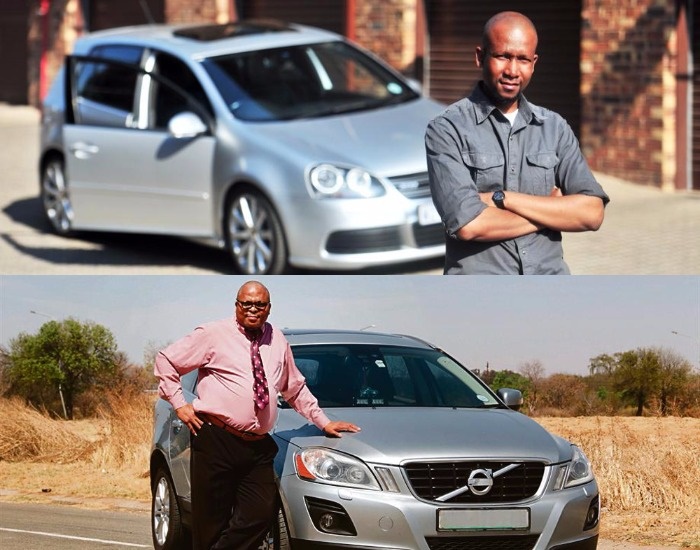
Follow six ordinary South Africans as they take up the Absa/City Press Money Makeover challenge and participate in a financial fitness boot camp. Maya Fisher-French will be sharing their stories with you and hopefully inspire you to start your own journey
When we received applications to enter the Money Makeover challenge, most applicants wrote that their biggest mistake was buying a car they couldn’t afford.
In the last edition, we looked at how to pay off short-term debt such as your credit card, personal loan and store cards. Getting out of those short-term debt traps is easier than we realise once we have a plan in place. However, when it comes to car finance, the debt trap is not so easy to escape, as contestants Vonne and Buti discovered.
Three years ago, departure controller and new dad Vonne bought the car of his dreams for R228 000, and it immediately put pressure on his finances. When he added in the cost of insuring the car and fuel consumption, nearly half of Vonne’s take-home pay was being spent on keeping his car on the road – this gave him very little room for any other financial goals.
When his girlfriend fell pregnant, Vonne’s priorities changed. He was no longer a bachelor with a sports car, but a father who wanted the very best for his daughter.
“My mistake was to buy a car worth that much. In my heart, I do not want to get rid of it. I hope there is a way to work around it, but I would be prepared to give it up,” Vonne told City Press at the start of the challenge.
By selling the car, Vonne could dramatically change his financial situation. Not only could he significantly reduce the R5 700 a month repayments, but a less expensive car would have lower insurance and fuel costs. Performance cars are more expensive to insure because they are usually bought by people who like to drive fast, so they carry a higher risk rating.
Devan Coopa of Absa Vehicle Finance looked into the various options available to Vonne. Unfortunately, due to the age and high mileage on the car, Vonne could only sell it for about R80 000, which would not settle the R156 000 outstanding debt. He would have to borrow R76 000 to settle the shortfall and then borrow a further amount to buy another car. While this could be a viable option due to the amount saved in fuel and insurance costs, Vonne’s credit access is limited due to his other debts.
As Vonne is struggling to meet the repayments and still has three years to go, the only option is to extend the term of payments to lower the monthly repayments. Absa agreed to extend the repayment term by a further two years, which reduces his repayment to R3 200 a month.
“The restructure, although not ideal, was done to meet his financial circumstances and is currently the only favourable outcome we have received for him from a cash flow perspective,” says Coopa.
While Coopa is not comfortable with Vonne extending his financing as it means he will only pay the car off when it is 14 years old, Vonne is thrilled that he gets to keep his car.
“I am concerned about the length of the payment period, but I am still happy with the car. I didn’t want to get into a long-term finance agreement with a car I was not happy with. I still get joy from my car and, although I was willing to make the compromise, I am very happy I am keeping it. Once my finances are in order, I will pay more into the car,” says Vonne.
WATCH: Vonne reach the tipping point with his dream car
Brigadier Buti, who is working towards being debt-free by the time he retires, landed up in his car finance nightmare after trading in his car, which he’d bought second-hand, when it started to give him problems. He decided to sell it and buy a car with a warranty and motor plan. However, he had a significant shortfall between the trade-in amount and the cost of the new car.
“The dealer sold me my current car, which is under warranty and has a motor plan, but he added so much money onto it [a balloon payment] so that I could trade in the car he sold me previously. Now the value of my current car is R180 000 and I owe R280 000,” says Buti.
His financial adviser, Matt Rudman, says the decision to finance the car with a residual or balloon payment was a mistake.
“Buti is planning to drive his car ‘until the wheels come off’ and will thus need additional capital to settle the balloon payment next year,” says Rudman.
If Buti does not have the money when the lump sum becomes due, he will either have to sell the car or take on more debt, which is not an option if he wants to be debt-free by retirement in five years’ time.
“The car might have been out of his budget when he initially purchased it, so the balloon payment was added as this reduced the monthly instalment, but, realistically, it was not in his budget,” says Rudman, who has put a plan in place for Buti to start saving towards the balloon payment.
WATCH: Buti plans for his retirement
If you are thinking about buying a car, learn from Vonne and Buti:
- Finance for a maximum of 60 months (ideally 54 months) and don’t opt for a residual or balloon payment. If you cannot finance it without a residual, you can’t afford it.
- Affordability is not just about the monthly repayment, but about how long you are locked into the car finance deal, as well as the running costs such as maintenance and insurance. The higher the performance of the car, the more you’ll pay for insurance and fuel.
- If you are already regretting the purchase, at least start putting the money away for the residual payment so that you do not have to refinance or sell the car, which would just put you back into the financing cycle.
- If you are struggling to meet your repayments, it may make sense to sell, even if you need to fund the shortfall, because a less expensive car has lower running costs.
- As a last resort, look at restructuring the finance, but try to pay in extra money as soon as your finances are back on track.
- Don’t hand your car over to other parties to take over payments without checking with your bank first or legally changing ownership – you are still legally obligated to pay for the vehicle whether it is in your possession or not.
48 Month finance option
Car finance: R100 000
Interest rate: 12.25%
Period: 48 months
Repayments per month: R2645
Total cost: R126 946 (interest costs R26 946)
60-month finance
Car finance: R100 000
Interest rate: 12.25%
Period: 60 months
Repayments per month: R1968
Total cost: R141 655.12 (R41 655)
Conclusion:
You will pay an extra R14 708.44 for the longer financing period.
The longer your repayment period, the longer it takes to reach break-even point where you can sell your car for what you owe. On a 72-month contract the break-even is 54 months – that means you owe more on your car than it is worth for nearly the first five years!




 Publications
Publications
 Partners
Partners








